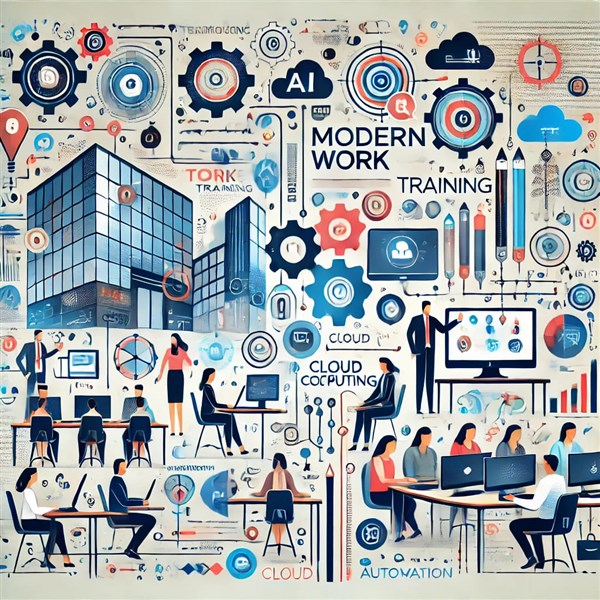Unable to find what you're searching for?
We're here to help you find it
The workplace has evolved dramatically in recent years, with remote work, hybrid teams, automation, and digital collaboration tools becoming the norm. Businesses that fail to adapt to these changes risk falling behind in efficiency, innovation, and employee engagement.
This is where a modern work training strategy becomes crucial. Organizations must equip employees with the skills and knowledge required to navigate digital tools, adapt to new workflows, and remain productive in a dynamic work environment.
In this blog, we’ll explore:
✔ What modern work training is and why it’s important
✔ Key components of an effective training strategy
✔ How modern work training improves business performance
✔ Best practices for implementing a successful training program
Let’s dive in!
Definition
Modern work training refers to workplace learning programs designed to prepare employees for today’s fast-changing business environment. It focuses on digital tools, collaboration platforms, soft skills, and remote work adaptability.
Why Traditional Training Methods Are No Longer Enough
✔ Technology evolves rapidly, requiring employees to continually upskill.
✔ Remote and hybrid work models demand training in virtual collaboration and communication.
✔ Automation and AI integration in workplaces require reskilling employees for new roles.
💡 Example: A company transitioning to Microsoft 365 and Teams needs modern work training to ensure employees effectively use collaborative tools, cloud storage, and automation features.
✔ Training ensures employees understand and effectively use digital tools, reducing time spent troubleshooting.
✔ Employees equipped with the right skills complete tasks faster and with fewer errors.
💡 Example: A sales team trained in CRM software like Salesforce can close deals faster by automating customer follow-ups instead of manually tracking leads.
✔ Businesses adopting cloud computing, AI, and automation must train employees to integrate these technologies into daily tasks.
✔ Digital literacy training prevents resistance to change and improves adoption rates.
💡 Example: A finance department trained in automation tools like Power Automate can reduce manual data entry, increasing accuracy and efficiency.
✔ Employees need training in virtual communication, collaboration tools, and time management to remain effective.
✔ Prevents miscommunication, disengagement, and productivity loss in remote work settings.
💡 Example: A remote team trained in Asana or Trello for project management works seamlessly without needing constant check-ins.
✔ Companies that invest in employee training see higher job satisfaction and reduced turnover.
✔ Employees feel valued when provided opportunities to upskill and grow their careers.
💡 Example: A company offering leadership training to mid-level managers creates a clear career growth path, reducing resignation rates.
✔ Organizations with skilled employees can quickly adapt to industry changes and technological advancements.
✔ Training ensures businesses remain ahead of competitors by improving service delivery and innovation.
💡 Example: A retail company trained in e-commerce and digital marketing successfully shifts from in-store sales to online platforms during a market downturn.
✔ Covers tools like Microsoft 365, Google Workspace, Zoom, and project management software.
✔ Helps employees master data analysis, automation, and cybersecurity basics.
✔ Focuses on communication, collaboration, emotional intelligence, and problem-solving.
✔ Prepares employees to work effectively in diverse, hybrid environments.
✔ Includes virtual teamwork, time management, and productivity techniques.
✔ Ensures employees are skilled in asynchronous communication and digital collaboration.
✔ Helps managers lead teams effectively in digital and hybrid environments.
✔ Prepares leaders for guiding employees through technological and structural changes.
✔ Protects businesses from cyber threats, phishing scams, and data breaches.
✔ Teaches employees best practices for secure remote work.
✔ Conduct employee surveys, skill assessments, and performance reviews to determine training needs.
✔ Prioritize digital literacy, collaboration, and emerging technology skills.
✔ Blended learning: Combine online courses, live workshops, and hands-on practice.
✔ Microlearning: Short, focused lessons improve retention and engagement.
✔ Gamification: Reward-based learning boosts motivation and participation.
✔ Offer on-demand courses, mentorship programs, and professional development workshops.
✔ Encourage employees to stay updated with industry trends and emerging technologies.
✔ Monitor training effectiveness using KPIs like employee performance, completion rates, and engagement levels.
✔ Collect feedback from employees to refine training content and delivery methods.
✔ Ensure training supports company objectives like digital transformation, innovation, or market expansion.
✔ Link learning programs to career advancement opportunities to increase participation.
✔ Microsoft provides ongoing digital skills training to employees using LinkedIn Learning and AI-powered tools.
✔ Result: Improved innovation, efficiency, and technology adoption across departments.
✔ Google developed custom training programs for hybrid teams, focusing on collaboration, cybersecurity, and digital well-being.
✔ Result: Increased employee satisfaction, flexibility, and engagement.
✔ IBM reskilled employees in AI, cloud computing, and automation to adapt to technological advancements.
✔ Result: Improved operational efficiency and innovation.
Conclusion: Why Modern Work Training is a Business Necessity
🚀 Key Takeaways:
✔ Digital transformation, remote work, and automation require continuous employee training.
✔ A strong training strategy improves productivity, engagement, and business competitiveness.
✔ Soft skills, cybersecurity, and leadership training are just as important as technical skills.
✔ Organizations that invest in modern work training attract and retain top talent.
Koenig Solutions is a leading IT training company providing certifications in top technology courses. With a team of experienced trainers and a wide range of courses, Koenig Solutions can help your business implement an effective Modern Work Training Strategy.
📢 Ready to future-proof your workforce? Start building a modern work training strategy today!

Aarav Goel has top education industry knowledge with 4 years of experience. Being a passionate blogger also does blogging on the technology niche.










